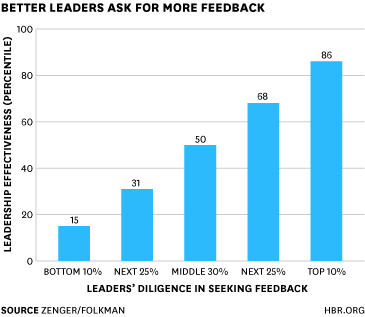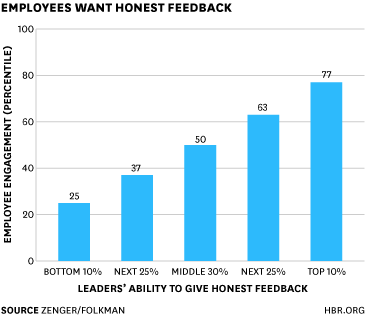Situation 1: Asking for it
You’re sitting at your desk when an e-mail pops up from your boss that cryptically states, “Please come to my office; we need to talk.” What’s the first thing you think?
For most people it’s, “Oh no – what did I do now!” or “Good gosh, what went wrong!” Of course it is possible that your boss wants to praise you, ask your opinion on something, or just discuss an issue, but the vast majority of people will assume they’re being called in to be called on the carpet for something or another. This assumption causes many people to avoid feedback all together — and not just those whose bosses actually do criticize them a lot or those who are insecure about their performance. Generalized “feedback phobia” is widespread.
This is a pity, as research clearly shows the advantage of receiving feedback on an ongoing basis. In our data, collected for more than a decade, we consistently find that leaders who ask for feedback are substantially more effective than leaders who don’t. In a recent study of 51,896 executives, for example, those who ranked at the bottom 10% in asking for feedback (that is to say, they asked for feedback less often than fully 90% of their peers) were rated at the 15th percentile in overall leadership effectiveness. On the other hand, leaders who ranked at the top 10% in asking for feedback were rated, on average, at the 86th percentile in overall leadership effectiveness.
The best leaders appear to ask more people for feedback and they ask for feedback more often. Rather than being fearful of feedback, they are comfortable receiving information about their behavior from their bosses, their colleagues, and their subordinates.
Situation 2: Dishing it out
It’s 8:45 am, and you are sitting at your desk. Right on time an Outlook reminder pops up announcing “Performance discussion with Darcy Pearson, 9:00 am.” You groan out loud and then think to yourself, Darcy’s performance has been terrible. Her attitude is bad, she has no energy, and her output is substandard. You feel dread in your stomach. Your anxiety is high. Your blood pressure is rising. Inwardly you say, They don’t pay me enough to do this job.
You’re thinking that no matter what you say or how you say it, the meeting will go badly. Your only thought about a possible solution is, The sooner I start this, the sooner it will be done. Sound familiar?
Most people can come up with several traumatic stories from their pasts in which they have given or received unconstructive, negative feedback. These terrible experiences embed themselves into our psyche and become a source of anxiety.
On the other hand, most people can also remember a time when someone gave them helpful feedback that contributed to a marked improvement in their effectiveness and influenced their success.
The ability to give honest feedback in a helpful way is closely aligned with employee engagement. In another recent study of 22,719 leaders, we found that those who ranked at the bottom 10% in their ability to give honest feedback to direct reports received engagement scores from their subordinates that averaged in the 25th percentile. Their subordinates disliked their jobs, their commitment was low, and they frequently thought about quitting. In contrast, those leaders who were judged better than 90% of their peers at giving honest feedback had subordinates who ranked at the 77th percentile in engagement (clearly feedback, while important, isn’t everything.)
How Good Are You at Getting and Giving Feedback? Assess Yourself
Knowing that it’s important to give and receive feedback is one thing. Knowing whether you do it well is another.
As a start, we have developed a self-assessment, which you can click on here that can measure your desire for giving and receiving positive and negative feedback. It also measures your overall feelings of self-confidence, since that trait correlates strongly with the desire to give and receive feedback.
This being a self-assessment, most people will not surprised by the results. Still, it will likely make the impressions you have about yourself very clear, and a clear view will often motivate people to improve. We invite you not only to take the self-assessment, but to share the results and insights you gain in the comment section below.



